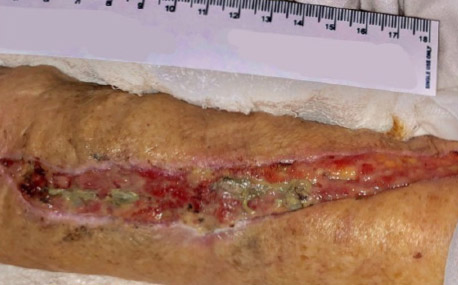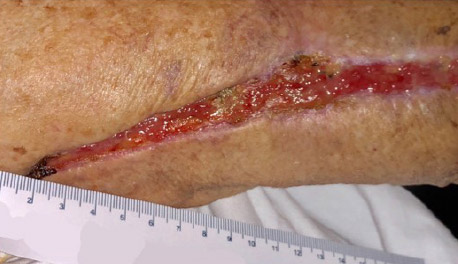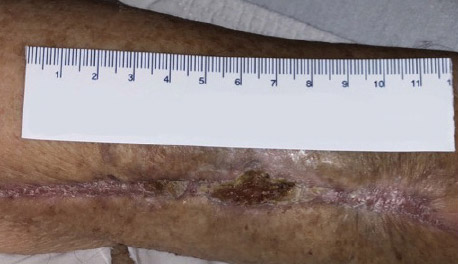Case study: Post-operative arteriovenous fistula (AVF) wound
Wound type:
Post-surgical
Patient
86-year-old male
History
Cerebrovascular disease, diabetes mellitus, anemia, coronary artery disease, hyperlipidemia, end-stage renal disease
AVF arm wound 100% resolved*
*Individual results will vary
Wound presentation
- The wound is a post-operative wound located over an arterio-venous fistula (AVF) of the left arm that had recently been revised
- Initially, the wound appeared to be 60% yellow-brown necrosis, 40% soft, pink granulation tissue with mild to moderate serosanguinos drainage
Treatment
This wound had been treated with triple antibiotic and a dry dressing changed daily for approximately two weeks prior to presenting at the clinic.
Week 1
- 18.2cm x 2.2cm x 0.3cm (depth estimated)
- This wound had been treated with triple antibiotic and a dry dressing change for approximately two weeks prior to presenting at the clinic
- SANTYL◊ Ointment ordered to be applied to wound bed, nickel thick, edge to edge and with Dakins 0.125% moistened gauze with roller gauze and elastic bandage compression daily
Week 2
- 18.1cm x 2.2cm x 0.2cm
- 60% granulation tissue, 30% soft, pink granulation tissue, 10% epithelial with mild serous drainage
- SANTYL Ointment applied to wound bed and Dakins 0.125% moistened gauze with kerlix and ACE bandage compression daily treatment continued
Week 3
- 18.1cm x 2.2cm x 0.2cm
- 70% granulation tissue, 10% soft, pink granulation tissue, 20% epithelial with mild serous drainage
- SANTYL Ointment applied 4x4 with roller gauze and elastic bandage compression daily; Dakins solution 0.125 discontinued at this visit
Week 5
- 1.5cm x 0.8cm x 0.1cm
- 90% granulation 10% epithelial; no drainage
- SANTYL Ointment applied 4x4 with roller gauze and elastic bandage compression daily
Result
AVF arm wound 100% resolved*
*Individual results will vary
Download patient case study: Post-operative arteriovenous fistula (AVF) wound





